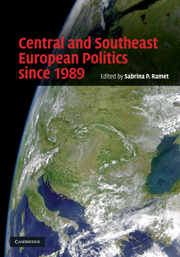Book contents
- Frontmatter
- Contents
- List of figures and maps
- List of tables
- Notes on the contributors
- Preface
- List of acronyms and abbreviations
- Guide to pronunciation of Central and Southeast European words
- 1 Central and Southeastern Europe, 1989
- 2 Central and Southeastern Europe, 2009
- Part 1 Introduction
- Part 2 Issues
- Part 3 Central Europe
- Part 4 Yugoslav Successor States
- Part 5 Southeastern Europe
- Part 6 Former Soviet republics
- Part 7 Present and future challenges
- 22 Regional security and regional relations
- 23 The EU and democratization in Central and Southeastern Europe since 1989
- 24 Facing the twenty-first century: lessons, questions, and tendencies (a conclusion)
- Index
- References
22 - Regional security and regional relations
Published online by Cambridge University Press: 05 June 2012
- Frontmatter
- Contents
- List of figures and maps
- List of tables
- Notes on the contributors
- Preface
- List of acronyms and abbreviations
- Guide to pronunciation of Central and Southeast European words
- 1 Central and Southeastern Europe, 1989
- 2 Central and Southeastern Europe, 2009
- Part 1 Introduction
- Part 2 Issues
- Part 3 Central Europe
- Part 4 Yugoslav Successor States
- Part 5 Southeastern Europe
- Part 6 Former Soviet republics
- Part 7 Present and future challenges
- 22 Regional security and regional relations
- 23 The EU and democratization in Central and Southeastern Europe since 1989
- 24 Facing the twenty-first century: lessons, questions, and tendencies (a conclusion)
- Index
- References
Summary
Central Europe's regional security and regional relations today are unimaginably different from those of 1989. The Warsaw Treaty Organization (WTO) and the Council for Mutual Economic Assistance (CMEA), the principal intergovernmental bodies to which these states belonged, were not devised so much for their own mutual benefit as to give a legalistic veneer of multilateralism and, foremost, to ensure their loyalty to Moscow. No socialist country that remained a member of those organizations practised what could be considered an independent foreign policy. The geopolitical orientation of these countries, regardless of any popular self-perceptions or desires otherwise, was to the East.
By 2007, ten post-communist states were members of NATO and of the EU (including six which had lacked statehood in 1989), and by 2009 Albania and Croatia had been admitted to the Alliance.
This chapter argues that the overall transformation of the region – in terms of regional self-perception, outside perceptions, and institutional memberships – was due to a significant extent to regional cooperation initiatives originating from within this region. By that we mean bodies created by these states and for these states, rather than any broader regional cooperation that may have stemmed, and belatedly so, from Western intergovernmental initiatives. Of course, Western institutional membership – foremost in the EC/EU and in NATO – became a primary foreign policy aim of these former Soviet satellite states. As this chapter also covers security, a final section addresses how NATO enlargement occurred.
- Type
- Chapter
- Information
- Central and Southeast European Politics since 1989 , pp. 495 - 518Publisher: Cambridge University PressPrint publication year: 2010
References
- 1
- Cited by



